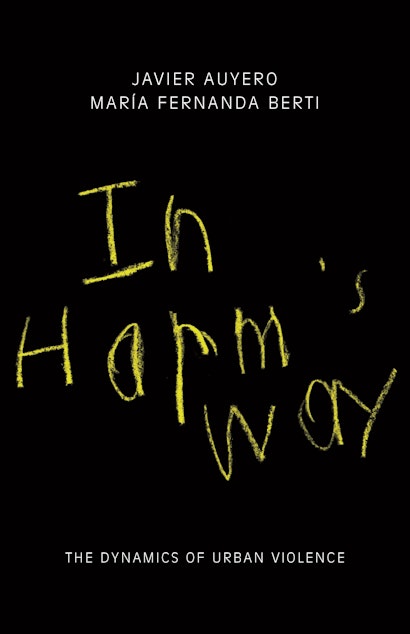Arquitecto Tucci, a neighborhood in Buenos Aires, is a place where crushing poverty and violent crime are everyday realities. Homicides—often involving young people—continue to skyrocket, and in the emergency room there, victims of shootings or knifings are an all-too-common sight. In Harm’s Way takes a harrowing look at daily life in Arquitecto Tucci, examining the sources, uses, and forms of interpersonal violence among the urban poor at the very margins of Argentine society.
Drawing on more than two years of immersive fieldwork, sociologist Javier Auyero and María Berti, an elementary school teacher in the neighborhood, provide a powerful and disarmingly intimate account of what it is like to live under the constant threat of violence. They argue that being physically aggressive becomes a habitual way of acting in poor and marginalized communities, and that violence is routine and carries across various domains of public and private life. Auyero and Berti trace how different types of violence—be it criminal, drug related, sexual, or domestic—overlap, intersect, and blur together. They show how the state is complicit in the production of harm, and describe the routines and relationships that residents, particularly children, establish to cope with and respond to the constant risk that besieges them and their loved ones.
Provocative, eye-opening, and extraordinarily moving, In Harm’s Way is destined to become a classic work on violence at the urban margins.
Awards and Recognition
- Winners of the 2016 Robert E. Park Award, Community and Urban Sociology Section of the American Sociological Association
Javier Auyero is professor of Latin American sociology at the University of Texas at Austin. María Fernanda Berti is an elementary school teacher in Buenos Aires.
"An important ethnography that, with a focus on social relations and not on individuals, meaningfully advances our understandings of violence and the lives of impoverished dwellers. As with good books, this one also inspires reflection and questions, perhaps for future research."—Cecilia Menjívar, American Journal of Sociology
"The authors provide a much-needed window upon a messy and brutal urban front line for those of us who would rather stay at home."—GO'T, Latin American Review of Books
"In Harm's Way is a jarringly powerful ethnographic study of how pervasive violence penetrated and remade the social fabric of an impoverished urban community. Javier Auyero and María Fernanda Berti spent years observing intimate yet frequently brutal interactions in the streets, schools, hospitals, and homes of one Buenos Aires neighborhood, but their account of the surprising ways that conflict binds people together has universal significance."—Eric Klinenberg, author of Heat Wave and Going Solo
"This remarkable book offers a vivid ethnographic glimpse of daily life in a sprawling Argentine slum as seen through the eyes of its residents. In Harm's Way explores the links between urban violence and the larger dynamics of Argentina's changing society, combining gripping description with powerful analysis. Auyero and Berti offer important new insights into contemporary life on the periphery."—Gay W. Seidman, author of Beyond the Boycott: Labor Rights, Human Rights, and Transnational Activism
"This is a terrific book. Drawing on remarkably difficult and creative long-term and cross-generational ethnography in an extremely distressed marginal neighborhood, In Harm's Way represents an innovative, well-theorized approach to urban violence in the contemporary era."—Philippe Bourgois, author of In Search of Respect: Selling Crack in El Barrio
"In Harm's Way provides a new, refreshing—and disturbing—glimpse into the face of human pain and suffering in ultra-marginal locations. This powerful and sobering book stands in line with the best and most popular ethnographies on urban violence."—Randol Contreras, author of The Stickup Kids: Race, Drugs, Violence, and the American Dream

